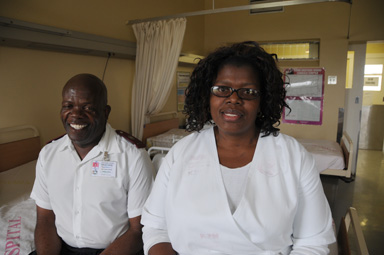International Rotavirus Symposium: A Report from South Africa
|

It is hardly a month since the football frenzy ended, vuvuzelas were stored away, and South Africa could proudly say it was the first African nation to host the World Cup. South Africa boasts other firsts.
It is the first African nation to host an International Rotavirus Symposium and the first sub Saharan country to include rotavirus vaccine in its Expanded Program of Immunization (EPI). This two day symposium, which ends on August 3, 2010, brings together scientists, clinicians, public health and immunization professionals, vaccine industry representatives and implementing organizations to discuss latest research results, clinical trials and new vaccine approaches.
Rotavirus was discovered 37 years ago and by some strange coincidence, the first participant right next to me happens to have celebrated his 37th birthday early this year. Valentine Ngum Ndze from Cameroon is doing his PhD in Rotavirus Molecular diversity at the University of Yaounde. Valentine's drive to contribute to the development of a rotavirus vaccine for the masses is driven by the desire to reduce the diarrhoeal disease burden in his country. For Dr. Bagrey Ngwira, a researcher in Malawi's Ministry of Health, his contribution as one of the investigators in Malawi's clinical trials will go a long way in influencing their country's policy as well as feed into the wider studies on rotavirus. As the two academicians share their trials and tribulations in research, I saunter off to another animated discussion - cold chain capacity. Olbert Silwimba, in charge of Zambia's EPI cold chain supply and Dominic Mutie, an officer in the Division of Vaccines and Immunization in Kenya's Ministry of Health share the challenges in their respective cold chain systems. Their stories bear various similarities. In both countries, diarrhoea is one of the leading causes of child mortality in under-fives; both countries acknowledge the need for rotavirus vaccine as one of the interventions to control diarrhoeal diseases, and finally, both countries need to expand their cold chain systems to accommodate new vaccines. Just as the discussion was heating up, the time keeper's bell sounded heralding the start of the next session.














